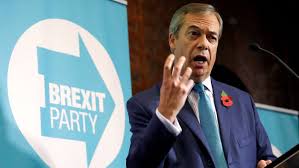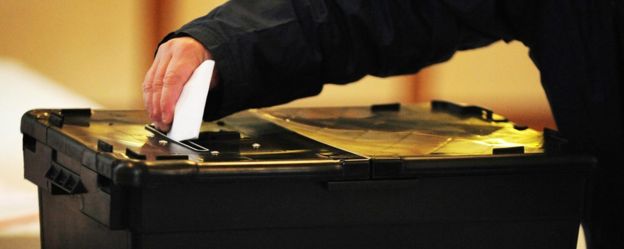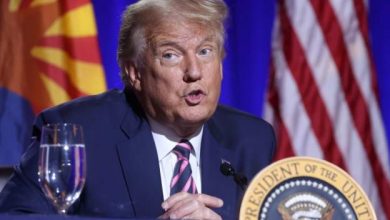International
General election 2019: Brexit Party will not stand in Tory seats

The Brexit Party has announced that it will not stand candidates in the 317 seats won by the Conservatives at the 2017 general election.
Party leader Nigel Farage said standing candidates across the country could increase the chances of another EU referendum taking place.
But he said the party would stand against all other parties – and focus on taking seats off Labour.
It had vowed to stand more than 600 candidates. The Commons has 650 seats.
Prime Minister Boris Johnson welcomed the move, calling it “a recognition that there’s only one way to get Brexit done, and that’s to vote for the Conservatives”.
But Tory chairman James Cleverly added there was still a “danger” the Brexit Party could split the vote in target seats, leading to the election of MPs who could “frustrate the Brexit process”.
Explaining his decision to supporters in Hartlepool, Mr Farage said Mr Johnson had recently signalled a “big shift of position” in his approach to Brexit.
He cited a pledge by the PM not to extend the transition period that would follow the UK’s departure from the EU. This would see Britain sticking to the European Union’s rules on issues such as freedom of movement until December 2020.
Mr Farage also said he was encouraged by recent commitments from Mr Johnson to seek further divergence from EU rules in a post-Brexit trade deal.
He added that this was a “huge change” from the kind of trade pact that had been planned under former PM Theresa May.
‘Unilateral Leave alliance’
Labour Party chairman Ian Lavery urged voters to “reject this Thatcherite 1980s tribute act, which would lead to more savage Tory attacks on working class communities”.
Liberal Democrat deputy leader Sir Ed Davey said Mr Farage’s decision “shows the Conservatives and the Brexit Party are now one and the same”.
Mr Farage had previously offered to not to stand candidates against the Tories in certain seats if the prime minister changed aspects of his Brexit deal.
But the proposal was rejected by Boris Johnson, who said deals with “any other party” would “risk putting Jeremy Corbyn into No 10”.
Mr Farage said he had “genuinely tried” to forge a so-called “Leave alliance” with the Tories, but his efforts had gone nowhere.
“In a sense we now have a Leave alliance, it’s just that we’ve done it unilaterally,” he added.
Mr Farage has already confirmed he will not be standing himself in the election, saying he wanted to concentrate on helping his party’s candidates.

 PA MEDIA
PA MEDIAWill Brexit Party move help the Conservatives?
By BBC political analyst Peter Barnes
The Brexit Party’s decision to stand aside in constituencies the Conservatives won in 2017 should make it easier for them to hold on to those seats.
In marginals like St Ives and Mansfield, it ought to help them keep a bigger share of the pro-Leave vote.
However, to win a majority in the House of Commons the Conservatives need to win more seats – not just hold on to what they have.
And in those places the presence of a Brexit Party candidate may get in the Conservatives’ way.
The best estimates suggest that 29 of the Conservatives top 50 targets, and 59 of the top 100, are in Labour-held seats that voted Leave in the referendum.
If the strategy is to target Leave voters in those places, it would probably be better to have a clear run – without the Brexit Party.
Brexit Party MEP Ann Widdecombe said Mr Farage had gone “a very, very long way” by ruling out standing in seats won by the Tories at the last election.
“That is an enormous concession, it is, as he put it himself, a sort of unilateral pact,” she told BBC Radio 4’s World at One programme.
She added: “You really can’t expect that we’re not going to take Labour on, and we are and any consequences that flow from that are down to Boris’s stubbornness.”
Scottish National Party leader Nicola Sturgeon said the Conservatives have “effectively become the Brexit Party”.
Pro-Remain election pact
She added that defeating the Tories in Scotland “will help deprive Boris Johnson’s increasingly extreme and right-wing party of the majority they crave”.
Anti-Brexit parties Plaid Cymru, the Green Party and the Liberal Democrats have agreed not to stand against each other in 60 seats across England and Wales.
Their pact means that, in Wales, two of the parties will agree not to field a candidate, boosting the third candidate’s chances of picking up the Remain vote.
In England, it will simply be a two-way agreement between the Lib Dems and the Greens.
Source: BBC



